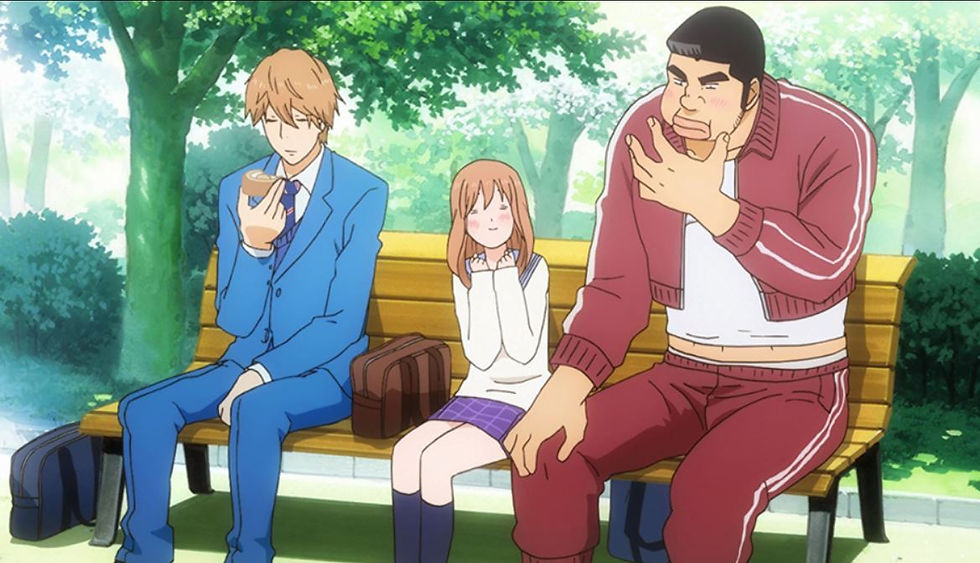Recommends: My Top 20 Anime Series (Part 2)
- Kerry Chambers
- Sep 9, 2020
- 16 min read
Updated: Dec 12, 2020
“Animators can only draw from their own experiences of pain and shock and emotions.” - Hayao Miyazaki

Back again to continue the list of my top 20 influential anime series. If you missed part one, find it here. I still feel the need to share these greats stories and proved that animation is possibly one of the highest forms of storytelling available. With all the emotions, the images and the worlds we can create with it, it's amazing it's not regarded higher. In my last list, there was a lot of romance but now is where i get to the nitty-gritty. I knew I was a romantic at heart, but even more so I like dark, twisted miserable characters with glimmers of hope. The next ones will be my emotional rollercoasters. Let's get cracking as I head into my top 10, a real struggle to narrow down!

10. Terror in Resonance (Dir. Shinichiro Watanabe, 2014)
(Sub) 11 Episodes
Short but not sweet, this is Watanabe's underappreciated hidden gem. In many weird ways, it might be his gentlest series. Collaborating with Yoko Kanno to make one of best soundtracks to date inspired by Icelandic musicians, this melancholy show follows a pair of teenage terrorists. After starting school, they catch the attention of an abused and bullied young girl who finds herself drawn to the pair: ‘That smile was like the sun on a hot summer day.....with eyes like ice'. As time goes by, their motives for destruction becomes clearer but far more complicated as other organisations become involved.

A conspiracy thriller for sure, it’s still more than that. It’s the relationship between the three; it’s the hard-working but understanding cop who is trying to make sense of it all. There are scenes so breathtaking; you’ll be re-watching them over and over. It’s beautifully composed and choreographed, the music is haunting, the boys are heart-breaking (Nine needs a warm blanket and an even warmer hug). There are flaws, I shan’t forget them, but these don’t take away from the overall arc. That final episode is one we know we must face, but it will still hurt just the same.

9. Erased (Dir. Tomohiko Itō, 2016)
(Sub) 12 Episodes
This one is an acclaimed gem, based on the manga by Kei Sanbe (Called Boku Dake Ga Inai Machi in Japanese which loosely translates as The Town Where Only I Don’t Exist). Another short series that packs a great story into a little time frame, it’s incredibly effective. Satoru has always had the ability to skip back in time, only a few minutes or so, to avoid accidents before they happen. He’s had no control over it. When his mother comes to visit him, she begins to investigate the seemingly solved murders of three of Satoru’s childhood friends. This leads to her eventual demise, and now framed for it, in a state of panic he travels back to school, to days before the incidents ever took place. He now has a second chance, to save his mother and the children.

A murder mystery, time-travel and sweet and tender childhood friendships. Erased has this feeling of nostalgia to it that I can’t quite explain, watching an adult Satoru relive his youth and appreciate all the little things is touching. The show also captures the helplessness of children seeing bad things and not able to communicate it to the adult world. They capture this so beautifully, the great divide and it only adds to the tension. I deeply cared for all the characters in this show and it’s very easy to binge through. Some people are disappointed by the final moments but for me, it feels right. (It's also got a real bopper of an intro, Asian Kung-Fu Generation be sleighing it with Re Re!)

8. Berserk (Dir. Naohito Takahashi & Kazuya Murata, 1997)
(Dub) 25 Episodes
Guts is my boy! I'm not talking about the joke that is 2016’s attempt at an adaptation taking later chapters and butchering them with the most inorganic and ugliest looking direction of all time, nor the Golden Age Arc rehash films that were decent enough but struggled in its balance of 2D and distracting 3D animation which redeemed itself with a great third and final entry in The Advent. No, this is Kentaro Miura’s Manga’s first attempt at Anime resurrection and still the best despite low production costs and only being able to cover a slither of the huge series that is still being written to this day.

Guts is a brutal warrior that faces demons who come for his blood day in and day out. He’s strong, ruthless, terrifying and alone. We then travel back in time to when he is just in his teens, working as mercenary. He is recruited by the Band of the Hawk, led by Griffith and his second in command the skilled swords-woman Casca, and they crawl their way to the top of society, considered one of the greatest tactical mercenary bands of all time. Guts finally finds his place, with people he can consider friends. But soon, supernatural occurrences challenge them and reveal that the world is far more terrifying than first imagined.

This show is remembered fondly by many and for good reason. As well as being unexpectedly amazing, it introduced a lot of people to the Manga and one of the coolest characters in the fictional world. But it also tried its hardest with what it had. A beautiful score (Guts Theme gets everyone lit), some amazing stills from the manga colourised beautifully for the show to try and do some justice to the art work achieved by Miura. It’s full of so much heart, Guts is an incredibly relatable protagonist and it also carries one of the most beautiful love stories in any series. However, continue the manga for what is one of the most moving character arcs of all time; Guts story is harrowing from the beginning. This show only makes iconic one of the manga world’s most significant arcs, the Golden Age.

Note: The show is pretty brutal, watch the dub outtakes on each disc of the DVDs to relieve some of the miserable tension and canonize Griffith’s musical abilities. Whitney Houston will never sound the same again

7. Neon Genesis Evangelion (Dir. Hideaki Anno, 1995)
(Sub) 26 Episodes + 2 Films + 3 RE:Do’s + TBR
Anno; sticking psychologically damaged teens in humanoid mechas since 1995. Rule of thumb is to never skip the intro on this one because Cruel Angel Thesis is a banger nor the various awesome Fly me to the Moon renditions each episode plays out to. This is a huge franchise now but once upon a time there was only this (and its intended companion manga that only finished in 2014).

Psychological drama with elements of action, violence, romance, philosophy and apocalyptic themes not to forget the overwhelming maternal imagery throughout the show, Neon Genesis is really hard to explain and categorise. Shinji, a lonely teenage boy, is summoned the Tokyo 3 to join Nerv, an organisation working on the defence of the world from the horrifying ‘Angels’ that have been emerging with more frequency over the past fifteen years following the First Impact. To fight them they have developed ‘Evangelions’, synthetic Angels that can only be piloted by fourteen years-olds, in a desperate attempt the oncoming Third Impact predicted to be fatal for all mankind. Upon arrival, Shinji is thrust into one of them and forced to battle an attacking angel, defeating it in cold blood and having the highest synchronicity level of any pilot so far. Good on him!

One of the most unexpected things for me about the series was just how much it packed into it, because my knowledge of it was fighting robots. Not a show that seriously explores the effects of depression and neglect. Every character is severely broken and yet somehow still fighting to save a world that has done them no favours. The one suffering most of all is Shinji, who struggles with his mental health, his neglectful and distant father who is the head of Nerv and his overwhelming responsibility. And although he may be frustrating at times, he’s probably one of the most relatable characters in any series. Amongst the scatterings of happy moments, glimmers of a love story and impressive action sequence with brilliant animation, it is Shinji's inability to take the advice of those around him, those who care about him, that lingers with me. That and every brilliant scene between Kaji and Misato!

Fun fact: The Japanese voice of Ryoji Kaji is also the voice actor for Spike Spiegel so he voiced two of the best boys in Anime history. But Steve Blum’s Spike is more popular in Japan!

6. Clannad & Clannad: After Story (Dir. Tatsuya Ishihara 2007-2009)
(Dub) 2 Series, 44 episodes + 5 OVA’s
This series is misleadingly cute. One of the first shows I got into, It seems like your average Slice-of-Life High School Romance, based on a Visual Novel, with some fairy tale like qualities, dabblings of parallel universes and supernatural elements that seemingly go nowhere until the heartbreaker that is After Story. You can view Clannad's first series on its own, through the laughs, the joy and the bittersweet moments, but its second series is what brings home its overall messages with a heavy wallop.

Tomoya, in his last year at High School, hates the town he lives. He hates school and always gets into fights but avoids going home because his dad is an alcoholic. Then he meets the strange but caring Nagisa. She was held back a year due to illness and now wants to start a drama club but can’t seem to find members. He decides to help her and what follows is a beautiful story of friendship as they draw more people to them. And in time Tomoya starts to enjoy the good he brings to people and the time he spends with Nagisa. Meanwhile, After Story follows the events of the characters after they leave school and the hardships of growing up, adult responsibilities and the cruel things life hands us.

The show explores family and how love can bring so many people together with such simple acts of kindness. But most importantly, it explores regret and hope. That things happen for a reason and we must learn with life’s lessons. We must enjoy what we have and the time we spent with those people. Honestly, I got teary-eyed in series one but I was in deep mourning as I tried to process series two. I put it off for so long, knowing it was going to hurt but it hit me harder than I expected. There is nothing more heartbreaking than regret, and to watch someone take on the responsibility of something that should have been beautiful and see it as the undoing of their lives.

But that’s why Clannad is so brilliant; it taught me life lessons and lingers with me even now. It taught me all about hope and the magic of everyday existence. And it has amazing visuals especially in After Story, a beautifully wholesome cast (Nagisa’s parents are the loveliest couple in Anime) and a wonderful soundtrack including the powerful track Parting at the Foot of the Hill. It’s a series you grow with, but you don’t leave it behind.

5. Psycho-Pass (Dir. Naoyoshi Shiotani & Katsuyuki Motohiro, 2012 – Present)
(Sub) 3 Series, 41 Episodes + 5 Movies (Including Sinner of the Systems as one film each)
Imagine a world where the government knows if you are capable of committing a crime before you have even thought about it. Imagine a world that monitors humans so closely that it decides where you should work, who you should know and what you should feel. Psycho-Pass readings and the Sybil System controls all these things. Yet the show doesn’t treat it like a dystopia. Society thinks everything is fine, that this is how it should be. It makes it so much scarier.

Akane Tsunemori, a highly intelligent and caring individual, turns up on her first day on the job as an inspector for the police force. She is shocked that she is working with latent criminals known as Enforcers– those whose psycho-pass is too high and cannot be returned to normal society via therapies and so on. Eventually during the particularly distressing case, she goes against protocol, using her own sense of judgement rather than relying on the technology provided. In this cyberpunk world where technology rules, Akane is one of the few willing to question it, putting justice first. This catches the eye of the higher ups and her co-worker, the enforcer and roguish Shinya Kogami. And it just gets better from there. They’re mentor/student relationship brims with one of the best on-screen crime fighting duos since Mulder and Scully in The X-Files.
The premise is brilliant; the characters even better with a world that one wants to keep exploring long after the credits roll. Yugo Kanno’s awesome soundtrack, a blend of bassy bangers (Like seriously, a gun has it's own theme and it's awesome) and sweeping orchestral scores makes the experience all the more immersive. The series loses its way after a while, somewhere around series two, but there no denying any scene with Akane, Kogami or the fabulous Ginoza Nobuchiko is engrossing, with a combination of the three being chemistry-galore, that it can be forgiven. In fact it’s the characters that carry you through this one, when it seems to be stumbling; they’re always there to pick it up. You fall hopelessly for the team. I’m hoping we’ll get a little bit more out of this franchise before it ends; it’s really worth the watch.

4. Wolf’s Rain (Dir. Tensai Okamura, 2003)
(Sub) 26 Episodes + 4 OVAs
In a future where nobility rules and people live in domed cities, wolves are hunted and believed extinct. Although few remain, they can take the form of humans, roaming amongst them in disguise. The apocalyptic world with many an unforgiving landscape makes way for selfish humans and barren worlds ravaged by human evolution. One wolf, Kiba finds his way into a city, following the scent of the moon-flower, believing that it will lead him to Paradise. He gathers a pack, all searching for escape and freedom from the depressing world, guided by Kiba and the flower-maiden Cheza.

This one is a cult classic. Written and created Keiko Nobumoto, a writer for Cowboy Bebop and scored by the wonderful Yoko Kanno carrying the show from amazing to god tier status, Wolf’s Rain is a must watch for any interested in watching the essentials. You’re dead inside if you don’t love the characters (Toboe!), skip the intro (Steve Conte’s Stray 80's throwback banger is my tune at the moment) or fail to cry at least three times.

Most importantly it’s a powerful journey exploring what it means to live. Incredibly philosophical and touching, I don’t’ really know how else to explain this show. Because I can’t do it justice at all. What I do know is that it left an imprint on me and I will never forget it.

3. My Love Story (Dir. Morio Asaka, 2015)
(Sub) 24 Episodes
This show is one of the best romances out there and based on the manga of the same name by Kazune Kawahara. Takeo is a beast of high schooler, loved by his male classmates but mocked by many of the girls he crushes on, really he's just a gentle giant. One day he protects the very pretty and very sweet Rinko from a groper on a train. To thank him she makes him a delicious cake bu following some misunderstandings, Takeo is convinced she is in live with his best fringe, begrudging ladies man Suna. With the help of Suna, who has to put a lot of work in because Takeo is a dope, he is able to realise that she likes him and they become a couple. The series follows them as they struggle over various relationship hurdles; introducing him to her friends, first dates and holding hands. It’s very funny and very cute.

A beauty and the beast story with a lot more going on, this was another programme I binged whilst rather unwell and it became an instant favourite. I’ve re-watched it often since, loving the relationships amongst all the characters, the kindness of the shows message and the daftness of some of the situations Takeo’s dense-ness can get him into. Not to forget his fabulously strange parents - any scene with them is bound to make you giggle. It’s a truly wholesome love story. But best of all, it has the loveliest bromance of all time. Takeo and Suna really are the best of friends and sometimes I wonder if the title of My Love Story is referring to the friendship we all wish we could have. Suna really is a great guy!

(It also has one of the most romantic ending songs, Whereabouts of Happiness, to any series of all time by the brilliant Local Connect - love transcends the barriers of language!)
2. Gintama (2006-2018…maybe)
(Sub) 353 Episodes + 2 Movies + 2 Live-Action
The funniest Shonen of all time adapted from Hideaki Sorachi equally as funny Manga series and next to impossible to dub into English due to so many culturally specific jokes, Gintama is golden. Even it's title is a pun on the Japanese word 'Kintama' meaning 'testicles' with kanji symbols being 'gold' (Kin) and 'ball' (tama). However the Kanji symbols used for Gintama are 'silver' (Gin) and 'soul' (tama). There is some relation to our Silver-haired hero.

In a world where Amanto (Aliens) conquered planet earth and the land of the Samurai, a war broke out and twenty years on, they live in semi-harmony, swords are banned, and warriors have found new ways to survive. One such Samurai is the very lazy but exceptionally skilled and powerful Gintoki Sakata, who has founded an odd jobs business known as the Yorozuya which he runs with the help of aspiring teen samurai Shinpachi and gluttonous Yato (A clan of outrageously strong Amanto now dwindling in numbers) Kagura. Living from day to day, they really will do any job as long as Gintoki can get his parfait at the end of it all. Yet, something about Gintoki draws people to him, from all walks of life and in the end he's able to say the right thing even if it take a long time to get there. And Shinpachi and Kagura are not just his employees, their his family.

But they're not the only great characters. The cast is vast for this show and there’s not many to hate. From the Shinsengumi, (the police force who lost their cool status long ago) with its sadistic Sougo and chain-smoking, mayonnaise-loving Hijikata who seems to fight with Gintoki and with Gintoki if you catch my drift, the stupid Anti-foreigner faction leader Katsura (often nicknamed to his dismay, 'Zura' meaning 'wig'), the mess that is Madao, there’s just too many great characters to adore. Even one-off characters are memorable in the series, all equally as daft as the next. No one keeps their cool for long in this show but you'll take them seriously when it matters most.

Gintama’s genius comes from toilet-humour balanced with great parody, fourth-wall breaks and quick wit. Even better, it’s the only show that can have you crying with laughter before pounding you in the soul and turning those tears to true sorrow. This shows been getting me through the tougher months and I can re-watch episodes over and over simply because I love their world. Gintama also comes with some of the most powerful arcs for characters and narratives, always satisfying in conclusion. It's fight scenes are epic in scale, with your favourite characters being pushed to real breaking points. Better yet, most of it's standalone episodes are delight. The show boasts an amazing soundtrack, great openings and outros that you’ll be downloading in no time, not to mention, it's blessed with a great set of voice actors. Seriously, they’re all brilliant.

1. Cowboy Bebop (Dir. Shinichiro Watanabe, 1998)
(Dub) 26 Episodes + 1 Movie
I think we all knew I was gonna say this was my number one. I’ve talked about it a lot. But Watanabe stole my heart. And for good reason. It’s the greatest anime of all time. Everything I love in a story in one; humour, pop-culture, brilliant and lovable characters, powerful side characters, a brilliant world, amazing arcs and an ending satisfying for the story and heartbreaking for the viewer. Bebop is cool, it’s moving, and it’s got that sexy 90’s anime look that I just die for, a brilliant colour palette, the haze, a universally acceptable and superior English dub and amazing character designs.
It’s supported by an epic soundtrack of rock, jazz and blues by the great Yoko Kanno once again (I think Space Lion is the greatest thing she ever composed) , working with the ever-slick The Seatbelts, with amazing vocals from the brilliant Mai Yamane (The Real Folk Blues is her crowning achievement but Blue is a close second) and Steve Conte (Call Me Call Me is perfection). This is another show you won’t be skipping any of its intro’s or outro’s. In fact you’re lame if you do. Go stand in a corner and think about what you’ve done.

Spike Spiegel is the greatest character in Animation history and there’s a reason. He’s so complex; lovable but harbouring a dark past, generous but cruel, greedy but fit as hell, able to smoke after a good long work out. But he’s not the only one; the crew of the Bebop are like family and with everyone serving a purpose. The wizened Jet, the greedy but lonely Faye, the child-genius Ed and the even smarter Corgi, Ein; where would be without them?

In fact there’s not an element of Bebop that is wasted, Watanabe utilises everything to its extreme, and even standalone episodes do wonders for a characters development. Take Cowboy Funk; Spike is faced with a guy just like himself and he hates his guts. It ends up being incredibly funny and ridiculous but it also helps us see how the rest of the crew and side characters possibly see him.

Most importantly the show is about people enslaved to their pasts, about suffering a living death. It explores the human condition, living on the edge just to feel alive again. Their complex found family dynamics will never enough for any of these characters as long as they have something they must face. It’s a tragedy, disguised as a fun action adventure series about a group of bounty hunters in the year 2071. It plays with all kinds of genres from noir to western, explores gender-tropes and builds a fascinating world for us to explore. There’s never been anything like it and there never will be again. Bebop is one of a kind.

There you have it. My Top 20 most influential anime series. Maybe you'll find your next favourite story to immerse yourself in or even more characters to fall head over heels for. If you missed part one you can find it here.
If you need a recap of part one, click here: Recommends: My Top 20 Anime Series (Part 1)
If you want you can check out my Top 15 Studio Ghibli List and the post that inspired this one, My Top 20 Influential Anime Films .
If you want to hear more about Bebop and my never-ending obsession, read my article on my Quarantine re-watch here.
See you Space Cowboy…

Honorable mentions and worth a visit after some familiarity with Anime:
Angel Beats (2010, Dub, 13 Episodes + 2 OVA), The Devil is a Part-Timer (2013, Sub, 13 Episodes), Hellsing Ultimate (2006-2010, Dub, 10 Episodes)
Bungo Stray Dogs (2016 -2019, Sub, 36 Episodes + 1 OVA + 1 Movie), After the Rain (2018, Sub, 12 Episodes), Eden of the East (2009-2010, Sub, 11 Episodes + 2 Movies)
Yona of the Dawn (2014, Sub, 24 Episodes + 3 OVAs)

Image List:
After the Rain. (2018). Directed by Ayumu Watanabe. [Stream]. UK: Amazon Prime
Angel Beats. (2010). Directed by Seiji Kishi. [DVD]. UK: Manga Entertainment
Berserk. (1997). Directed by Naohito Takahashi. [DVD]. UK: MVM Entertainment
Bungo Stray Dogs. (2016). Directed by Takuya Igarashi. [DVD]. UK: Manga Entertainment
Clannad. (2007). Directed by Tatsuya Ishihara. [DVD]. UK: Manga Entertainment
Clannad: After Story. (2009). Directed by Tatsuya Ishihara. [DVD]. UK: Manga Entertainment.
Cowboy Bebop Complete Collection. (2014). Directed by Shinchiro Watanabe. [DVD]. UK: All The Anime LTD.
The Devil is a Part-Timer. (2013). Directed by Naoto Hosoda. [DVD]. UK: Manga Entertainment
Eden of the East. (2009). Directed by Kenji Kamiyama. [DVD]. UK: Manga Entertainment
Erased. (2016). Directed by Tomohiko Itō. [DVD]. UK: All the Anime
Gintama. (2006-2018). Directed by Various. [DVD]. UK: Unknown
Hellsing Ultimate. (2010). Directed by Tomokazu Tokoro, Hiroyuki Tanaka, Yasuhiro Matsumura . [DVD]. UK: Manga Entertainment
My Love Story. (2015) Directed by Morio Asaka. [DVD]. UK: Manga Entertainment.
Neon Genesis Evangelion. (1995) Directed by Hideaki Anno. [DVD]. UK: Manga Entertainment.
Psycho-Pass. (2012). Directed by Naoyoshi Shiotani. [DVD]. UK: Manga Entertainment
Terror in Resonance. (2014). Directed by Shinichiro Watanabe. [DVD]. UK: All the Anime
Wolfs Rain. (2004). Directed by Tensai Okamura. [DVD].UK: All the Anime
Yona of the Dawn. (2014). Directed by Kazuhiro Yoneda. [DVD]. UK: Funimation

























Comentarios